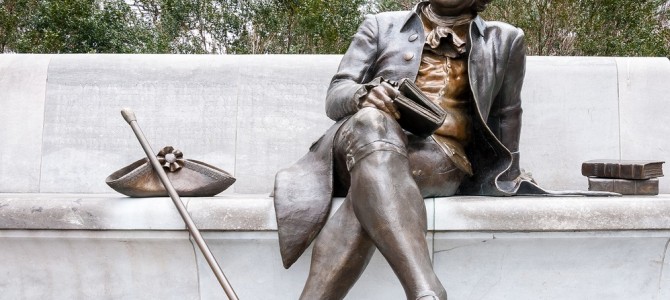President Obama appeared last night at a nationally televised CNN town hall meeting on gun control. Despite the folksy “town hall” terminology, participants attended by invitation only. The White House advertised the meeting as a chance for the president to “have a conversation with those who don’t agree,” but this CNN headline is more honest: “Obama to make case on guns at CNN town hall.”
This type of public relations theater from the White House is unsurprising. However, the choice of venue for the event adds insult to injury: the president made the case for his executive actions on gun control at none other than Virginia’s George Mason University.
Personally, I was rooting for the ghost of George Mason to appear uninvited, Shakespearean-style, and defend his name from being associated with all of this.
Meet George Mason, Self-Defense Lover
George Mason, born in Fairfax County, Virginia, was the most influential Founding Father you’ve never heard of. He was both a stalwart defender of individual rights—including the right to bear arms—and a fierce critic of government’s propensity to exceed its authority. In other words, he’d not only be against what the president did this week; he’d be even more firmly opposed to how he did it.
In addition to playing a prominent role at the federal Constitutional Convention, Mason wrote the Virginia Declaration of Rights, adopted in 1776. The Virginia Declaration influenced the themes of the Declaration of Independence and later became a model for the federal Bill of Rights.
Take, for example, Section 13 of the Virginia Declaration. It states, in full: “That a well-regulated militia, composed of the body of the people, trained to arms, is the proper, natural, and safe defense of a free state; that standing armies, in time of peace, should be avoided as dangerous to liberty; and that in all cases the military should be under strict subordination to, and governed by, the civil power.”
This reads like a blueprint for Second Amendment to the Constitution, and it’s even clearer here that the “militia” it refers to is composed of everyday citizens, rather than a standing army. Lest anyone doubt Mason’s opinion on this point, he later said, “What is the militia? It is the whole people, except for a few public officials.” He also made it clear that the right to bear arms serves primarily as a safeguard against tyranny: “To disarm the people [is] the best and most effectual way to enslave them.”
A Strong Opponent of Centralized Power
Besides being a firm advocate for gun rights, Mason very much opposed a strong executive at the head of the federal government. At the Constitutional Convention, he argued for a three-person executive committee rather than a single president. Having lost that battle, he argued for limiting the president’s tenure to one term, and for enshrining a process of impeachment—prevailing only on the second point.
In Mason’ view, the best government was that closest and most directly accountable to the people, which is why he tried to allot more power to the House of Representatives, as opposed to the indirectly elected Senate. Mason eventually refused to sign the final version of the Constitution, because it initially lacked a Bill of Rights and had made the federal government, in his view, too strong and centralized.
Given all this, one can only imagine Mason’s thoughts on a president who would flagrantly exceed his constitutional powers, assuming the authority to legislate. Actually, we don’t have to imagine it. “Flagrant Violations of the Constitution,” Mason wrote in 1783, “must disgust the best & wisest Part of the Community, occasion a general Depravity of Manners, bring the Legislature into Contempt, and finally produce Anarchy & public Convulsion.” Although he was then referring to state government, this sounds like a prophetic vision of Washington DC in 2016.
President Obama is welcome to sell his latest overreaches to the American people. But let’s respect the legacy of George Mason enough to leave him out of it.









